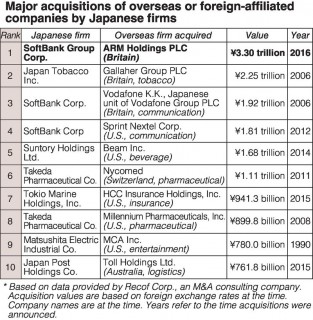Loading
Search
▼ Japanese Companies Dive Into Foreign Acquisitions
- Category:Other
With a shrinking domestic market due to the low birthrate and aging population, Japanese companies have increasingly looked overseas for mergers and acquisitions in recent years. The deal announced by SoftBank Group Corp. on Monday is a prime example.
SoftBank Group’s acquisition of major British chip designer ARM Holdings PLC is the largest one in history by a Japanese company.
According to Recof Corp., a firm that provides advice on corporate mergers and acquisitions, the deal is much larger than Japan Tobacco Inc.’s 2006 purchase of the British tobacco giant Gallaher Group PLC for ¥2.25 trillion.
Japanese companies started accelerating their overseas acquisitions around 2006. By then, the reorganization of domestic industries after the collapse of the bubble economy had reached a certain stability, and companies began looking abroad for growth.
Recently, several deals topping ¥1 trillion have made headlines, such as SoftBank Corp.’s 2012 purchase of Sprint Nextel Corp., a major U.S. telecommunications company, and Suntory Holdings Ltd.’s 2014 purchase of U.S. beverage maker Beam Inc.
In 2015, the insurance sector, which had been seen as inward-looking, shocked the market with several major foreign acquisitions.
Japanese companies spent ¥11.18 trillion on mergers and acquisitions of foreign companies in 2015, the first time this figure has topped ¥10 trillion.
“Japanese firms have accumulated internal reserves from record-breaking profits, but they haven’t been able to find investment targets domestically. This has left them with no other choice than buying foreign companies,” a securities company employee who is an expert on mergers and acquisitions said.
In addition, the Corporate Governance Code that went into effect last year calls on companies to maximize corporate value, so more large mergers and acquisitions by Japanese firms are expected.
Still, not all overseas deals succeed.
In 2008, major pharmaceutical firm Daiichi Sankyo Co. purchased an Indian generic drug maker for about ¥490 billion, only to sell the stock five years later at a deep discount.
Kirin Holdings Co. invested ¥300 billion in a major Brazilian beer maker in 2011. But business in Brazil has been poor, and the company ran a deficit for the first time since its founding in the fiscal year ending in December 2015.
The Yomiuri Shimbun
SoftBank Group’s acquisition of major British chip designer ARM Holdings PLC is the largest one in history by a Japanese company.
According to Recof Corp., a firm that provides advice on corporate mergers and acquisitions, the deal is much larger than Japan Tobacco Inc.’s 2006 purchase of the British tobacco giant Gallaher Group PLC for ¥2.25 trillion.
Japanese companies started accelerating their overseas acquisitions around 2006. By then, the reorganization of domestic industries after the collapse of the bubble economy had reached a certain stability, and companies began looking abroad for growth.
Recently, several deals topping ¥1 trillion have made headlines, such as SoftBank Corp.’s 2012 purchase of Sprint Nextel Corp., a major U.S. telecommunications company, and Suntory Holdings Ltd.’s 2014 purchase of U.S. beverage maker Beam Inc.
In 2015, the insurance sector, which had been seen as inward-looking, shocked the market with several major foreign acquisitions.
Japanese companies spent ¥11.18 trillion on mergers and acquisitions of foreign companies in 2015, the first time this figure has topped ¥10 trillion.
“Japanese firms have accumulated internal reserves from record-breaking profits, but they haven’t been able to find investment targets domestically. This has left them with no other choice than buying foreign companies,” a securities company employee who is an expert on mergers and acquisitions said.
In addition, the Corporate Governance Code that went into effect last year calls on companies to maximize corporate value, so more large mergers and acquisitions by Japanese firms are expected.
Still, not all overseas deals succeed.
In 2008, major pharmaceutical firm Daiichi Sankyo Co. purchased an Indian generic drug maker for about ¥490 billion, only to sell the stock five years later at a deep discount.
Kirin Holdings Co. invested ¥300 billion in a major Brazilian beer maker in 2011. But business in Brazil has been poor, and the company ran a deficit for the first time since its founding in the fiscal year ending in December 2015.
The Yomiuri Shimbun
- July 22, 2016
- Comment (0)
- Trackback(0)


